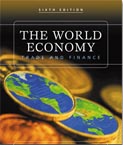Recession fears trump inflation worries in Australia
 Sydney - Despite inflation rising to its fastest pace since 1995, interest rates are likely to fall again before the end of the year because the Reserve Bank of Australia (RBA) is more worried about slowing growth than rising prices, economists said Wednesday.
Sydney - Despite inflation rising to its fastest pace since 1995, interest rates are likely to fall again before the end of the year because the Reserve Bank of Australia (RBA) is more worried about slowing growth than rising prices, economists said Wednesday.
The consumer price index (CPI) rose 1.2 per cent in the September quarter, taking the annualized inflation rate to 5 per cent from 4.5 per cent in the year to June.
But with monetary attuned to avoiding a recession, the RBA is expected to turn a blind eye to inflationary pressures and lower the cost of borrowing at its meeting next month.
The RBA, an independent body, is charged with keeping inflation at 2-3 per cent over the business cycle.
Two weeks ago the RBA surprised the market by slashing rates by 1 per cent to 6 per cent.
That was followed by the resetting of fiscal policy and the government issuing a stimulus package worth 10.4 billion Australian dollars (7.2 billion US dollars) intended to bolster the economy against the effects of the worldwide slowdown brought on by the international credit crisis.
"Given the weakness that we're expecting for the economy going forward, and particularly the weakness for the global economy, we see inflation falling quite quickly back to the top of the target band over the course of 2009," Citigroup economist Stephen Halmarick said. "So we should be back to around 3 per cent during the course of next year."
ANZ Bank economist Riki Polygenis said the CPI figures showed inflation had not been choked off by a collapse in the share market and plummeting commodity prices.
"These numbers reinforce calls for more moderate rate cuts from here and pushes the balance of risks towards 75 basis points of rate cuts by year end ... rather than the 100 basis points priced by markets," she said.
RBA governor Glenn Stevens anticipated the spike in inflation, saying it was the product of rising food and fuel prices. He once again welcomed the government's fiscal package and said it would work in tandem with the big rate cut as a bulwark against recession.
Another bonus, he said, was the "shock-absorber" 20-per-cent depreciation of the local currency against the US dollar.
"These changes will act to lessen the extent of the likely slowdown in Australia's economy even as global forces work the other way," Stevens said. (dpa)